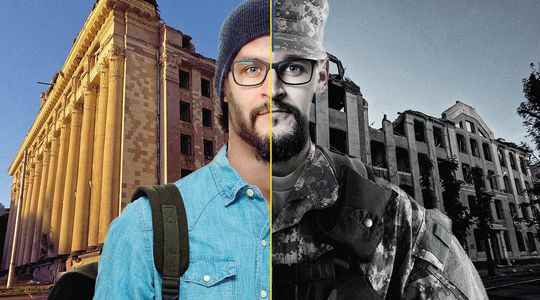On the phone, Mykola, 57, tells his story, cheerful, as if he were drinking a beer with an old friend. However, he leaves the hospital, and goes back to the front line. Like many Ukrainian tourist guides, the war forced him to change his life. Guide, driver, translator, he did a bit of everything between kyiv and Odessa. Abroad, too, on occasion. Amsterdam, Berlin, and then Paris… which he showers with praise: “France is freedom. It’s Victor Hugo, whom I adore!” Thirteen years ago, Mykola had to return his army uniform, where he officiated as a lieutenant-colonel. He had just been diagnosed with blood cancer. “Once I recovered, after my chemotherapy, all my friends expected me to become a bodyguard or a security guard, but I wanted to see the country!”
It will guide. In 2019, he treats himself to his dream, a Renault Traffic, and offers tours of Ukraine for groups of six to eight people. No more. The pandemic delays his plans; the war buries them. After the invasion, he volunteered. The army, less finicky about his health record, accepts it without flinching. To him the training of young inexperienced volunteers, who flock by the thousands. This has been his daily life for six months now. Briefly treated next to Dnipro for a hand injury, he returned to the eastern front. Hoping to get back on the road soon with “Mathilda”, the nickname of her car.
The story of his colleague Anna is an unexpected “success story”. In Lviv, where she had lived for three years, the end-of-year celebrations attracted thousands of tourists each year, who came to celebrate sometimes Saint Nicholas, sometimes Catholic Christmas, New Year or even Orthodox Christmas on January 7. “Between guides, we call it Ukrainian Ramadan,” she smiles. Welcomed at the start of the war in Warsaw, at the home of a Polish friend, she then undertook to create virtual tours of Ukraine. “A French company called me and offered to help me on a voluntary basis. I didn’t know anything about this.” Then she launches. Sitting at her desk, she tells Internet users, for 11 euros for an hour, the history and culture of her country. Customers flock, 130 visits already, especially American companies, which offer the activity to their employees.
“I’m a little traumatized”
In kyiv, Tetiana turned into a “fixer” for Japanese and then American television crews. This 40-year-old finds accommodation, bulletproof vests, organizes interviews, translates. The end of March is an emotional vertigo. Euphoria, first, with the withdrawal of Russian units from around kyiv. Then the shipwreck. A phone call informs him of the death of his little brother, on the eastern front. Howl his pain. Wait for the body. Bury it. Mourn. All this requires an energy that she had never thought she would one day have to tap into. “You can never understand this fear, this pain, before feeling it”, she explains in video from the terrace of a café. At the same time, the world discovers Boutcha’s atrocities. A massacre, forty minutes by car from her home. In a sob, Tetiana admits: “I am a little traumatized by this war.” From now on, she wants above all to occupy her mind as much as possible. Every Friday, she cooks homemade energy bars with friends, to send them to the men on the front lines.
They are more than 5000 guides to have witnessed the annihilation of their activity. But in kyiv or in the west of the country, you can still find guides who offer a tour of the city. “Most of the customers are actually displaced Ukrainians,” explains Mariana Oleksiv, head of the National Agency for Tourism Development. The official encourages the guides to go to the corners of the country where there is still some tourism. “But once the war is over, we would like the visitors to come back,” she hopes.
Can we imagine a post-conflict tourism, where we would go to the significant places of the war? Possible. But too early to seriously think about it. It will also be necessary to rebuild an international strategy. Before the war, the country from which the greatest number of tourists came was Russia.
This article is from our special issue “We Ukrainians”on newsstands August 24, in partnership with BFMTV.
